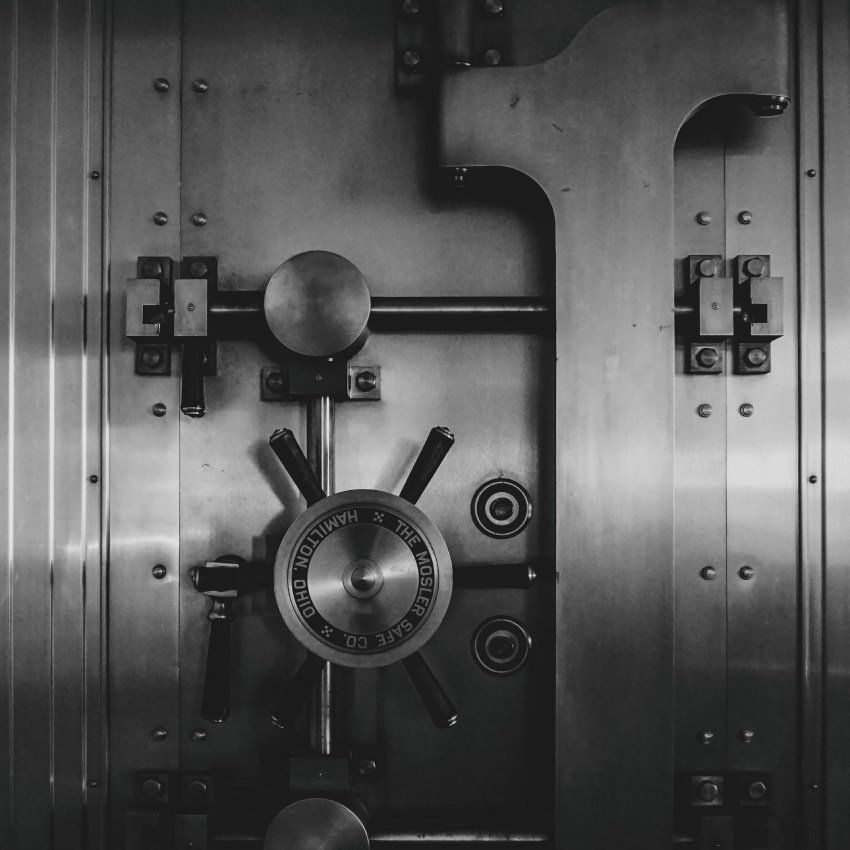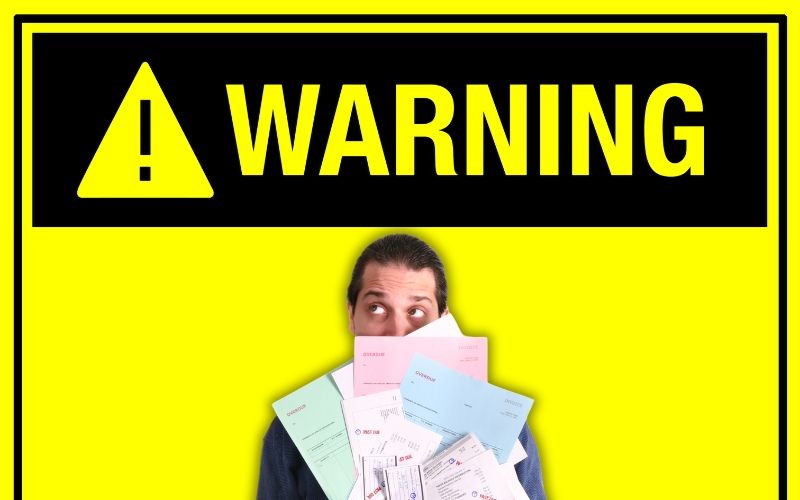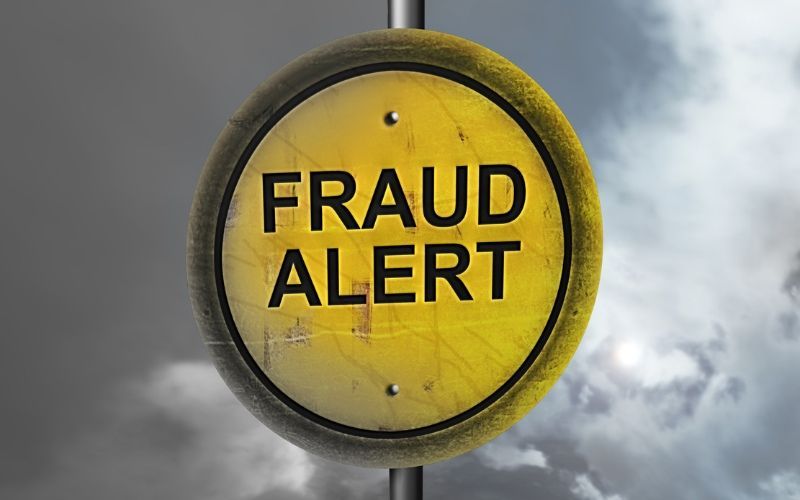How to Avoid a Frozen Bank Account
Last Updated: April 07, 2024
Strategies and Insights for Secure Banking

Disclaimer: We are not qualified legal or tax professionals and are not giving advice. Always speak with a qualified professional before making any legal or financial decisions.
Have you ever heard of people suddenly being locked out of their bank account, not being able to access their own money? It happens more often than you'd think. This post is all about why that can happen and how you can make sure it doesn't happen to you, keeping your money safe and sound.
We're going to share some easy tips and tricks that anyone can follow. Whether you're worried about debts, someone trying to steal your money, or just want to be extra careful, we've got you covered. Let's dive in and find out how to keep your bank account safe from being locked.
To skip the article and speak to a debt specialist right away, click here for a free consultation.
How Does Your Bank Account Get Frozen?
Assuming you are not a drug dealer, terrorist, or an enemy country, most people who have their bank accounts frozen are in some sort of financial difficulties and have had judgments against them in court.
Federal agencies like the IRS or the Department of Education and some state agencies such as departments of family services are not required to take you to court first. However, they must send you notice that they are going to garnish or levy your bank account.
Debt collectors and creditors can sue you in court and if they win, they can freeze your bank account. You should have received a summons letter from a court stating that you are going to be sued. If you ignored this summons, the court will automatically find in favor of the debt collector.
At that point, judgment creditors can access the judgment debtor account. Understanding what a bank levy is can help you better navigate this situation.
Wage garnishment versus freezing
Wage garnishment and freezing are two different methods that creditors use to legally get money to recover their losses. Both are done through the legal system.
Wage garnishment means that a certain portion of your paycheck is taken out by your employer and turned over to the creditor in order to pay personal debts. It can be very embarrassing to have a creditor garnish your wages.
Freezing a bank account means that the court instructs your bank to deny access to your bank account and to turn over the money to the creditor. This is known as a bank levy.
The federal government (for instance, the IRS because you owe back taxes) and state government agencies (such as family services) can demand wage garnishment or freeze bank accounts without a court order.
While it's important to build emergency savings and monitor bank statements, facing wage garnishment can still make you
feel helpless. Remember, a good attorney can provide the guidance and support you need during such challenging times.
What Happens When Your Bank Account is Frozen?

Once your bank account is frozen, you have no access to your personal funds. Any checks you write on the bank account will bounce and you will be charged NSF fees, you can not withdraw money and you can not make transfers out. You can make deposits into that bank account, but you won't be able to access the money as it now belongs to the judgment creditor.
It usually takes one to two weeks after a judgment to garnish a bank account. You should receive written notice that your bank account is being garnished, what you can do to lift the garnishment, any deadlines to object or challenge the garnishment, and other important information. If you, the judgment debtor, wish to challenge the garnishment, you need to file paperwork with the court.
Understanding Your Rights
Freezing of bank accounts
If you've been sued for debts in court or are behind on your taxes or child support, you may suddenly find yourself unable to access your bank account. Your income could be garnished by judgment creditors and your bank account, known as a judgment debtor account, could be frozen.
Federal agencies like the IRS or the Department of Education and some state agencies such as departments of family services are not required to take you to court first.
However, they must send you notice that they are going to garnish or levy your bank account. Debt collectors and creditors can sue you in court and if they win, they can freeze your bank account.
Exempt funds
Some exempt funds that cannot be seized past a certain amount or undergo creditor garnishment. These include Government benefits like Social Security, Unemployment Benefits, Retirement Benefits, Child support payments / Spousal Payments, Federal benefits like Veterans’ Benefits, Life Insurance Benefits, and Disability Benefits.
If you have funds that cannot be garnished, you can file for exemptions in court. You'll need to request a court hearing and file any paperwork to prove that the funds should be exempt.
Can Bankruptcy Help With Frozen Accounts?
Filing for bankruptcy may be an option if you are unable to pay back your debts and your accounts keep getting frozen. Bankruptcy stops all collection actions against you, including freezing accounts.
There are two main types of personal bankruptcy:
- Chapter 7 bankruptcy completely wipes out eligible debt like credit cards, personal loans, and medical bills. Any assets above exemption limits may be sold to pay creditors.
- Chapter 13 bankruptcy sets up a 3-5-year repayment plan to pay back a portion of your debt. You get to keep your assets.
Talk to a bankruptcy attorney to see if either Chapter 7 or Chapter 13 bankruptcy could help resolve your debt issues and prevent future account freezes.
How to avoid frozen bank accounts
The best way to avoid a frozen bank account is to take care of your financial business before you end up in court. If your credit card debt has gotten out of hand or you are missing bill payments on your consumer debt, you may be getting letters from creditors, do what you can to resolve the issue. This could include looking for debt relief like debt settlement or debt consolidation.
How to Dispute an Account Freeze
If you believe your account was frozen in error, you have the right to dispute it.
Here are the steps to take:
- Contact the bank immediately and ask why the freeze occurred. Request evidence and documentation.
- Review the freeze notice carefully for any inaccuracies. Double-check the creditor name, account numbers, amounts owed, etc.
- File paperwork with the court listed on the freeze notice contesting the freeze if errors are found or you have proof the funds are exempt.
- Consult a lawyer who can review the order and help draft the right forms to submit to the court. Time limits apply so act fast.
- Provide evidence like bank statements and receipts showing the funds are exempt.
- Request a court hearing to argue against the freeze if needed.
With the right evidence and legal help, you may be able to successfully dispute an improper account freeze.
How to Prevent Future Account Freezes
Here are proactive tips to help avoid account freezes down the road:
- Set up payment plans for outstanding debts. Stay current on payments.
- Look into debt relief options like debt consolidation loans or settlement if you are struggling with high balances.
- Maintain detailed financial records in case you need to prove funds are exempt.
- Open a separate account just for exempt deposits like Social Security.
- Consult a credit counselor for help creating a budget and improving your credit.
- Build an emergency fund equal to 3-6 months of expenses as a cushion.
- Review bank statements regularly for any suspicious activity. Report unauthorized activity right away.
- Talk to a lawyer immediately if you receive a court summons about debt. Don't ignore it.
- Consider incorporating your business to separate business and personal assets.
Proactively monitoring your finances, recordkeeping, and seeking help early can reduce the risk of surprise account freezes in the future.
Debt Collectors
If your credit card debt has gotten out of hand or you are missing bill payments on your consumer debt, you may be getting letters from creditors, do what you can to resolve the issue.
This could include looking for debt relief like debt settlement or debt consolidation.
Before a bank account levy occurs, a debt collector must send either a summons or a demand letter before the debt collector sues.
A summons means you are being sued in court. To understand the difference and what to do, check out this blog on the Difference Between a Summons and a Demand Letter.
Our blog is full of articles on how to get out of debt and deal with debt collection. If you are getting a lot of calls from debt collection agencies, give us a call to talk about debt relief.
Tax Debt
Tax debt is a very serious issue. If you get a letter from the IRS, open it and deal with it. The IRS is a very powerful governmental agency and they do not need to take you to court to have a bank levy your bank account. While the IRS can be hard to work with, they can help you set up payment plans.
Ignoring letters from the IRS can lead to other issues such as your passport being seized so that you cannot leave the country.
Talk to a tax lawyer or CPA for guidance.
Do not respond to phone calls, texts or emails from the IRS or state tax collector. They will not call or email you! A call or an email is a scam.
Child Support
Talk to a lawyer or consider filing for relief. However, child support is meant to support the child that you brought into the world. There is a moral obligation to support your child.
Are There Funds that Can Not be Frozen?
There are some exempt funds that can not be seized past a certain amount or undergo creditor garnishment.
These include:
- Government benefits like Social Security
- Unemployment Benefits
- Retirement Benefits
- Child support payments / Spousal Payments
- Federal benefits like Veterans’ Benefits
- Life Insurance Benefits
- Disability Benefits
In order to keep all the funds safe from a judgment creditor, use a separate bank account just for these monies. If exempt funds like Social Security benefits are mixed with non exempt funds, they are not safe from garnishment. In addition, the bank must ensure that your bank account balance contains two months' worth of exempt money.
How to Claim an Exemption
If you have funds that can not be garnished, you can file for exemptions in court. You'll need to request a court hearing and file any paperwork to prove that the funds should be exempt. You should have enough money to pay living expenses. Since each state is different, contact a qualified lawyer for more information.
The court will require that you take a means test. In a means test, you show your income and assets versus your expenses, especially related living expenses and the support of your dependents. If you do not have enough assets compared to expenses, the court will not allow your accounts to be garnished.
How to Open a Bank Account that No Creditor can Touch
There are three ways to open a bank account that no creditor can touch.
Joint account
If all the debt is in your name, open joint accounts in your and your spouse's names. If the debt is in both names, this does not work.
Exempt funds account
The second way is to open a bank account that includes all your money that is exempt like Social Security benefits. Direct deposit exempt funds into this bank account and pay bills out of that bank account. Do not transfer it to a separate bank account with non exempt funds, or it can be frozen.
Out of state accounts
The third way is to open a bank account in states with favorable laws against wage garnishment.
These states include New York, South Carolina, Maryland, North Dakota, and New Hampshire. Each of these states has a different amount of tax exempt funds, between $1,716 and $8,000.
This does not always work because state laws determine if you can open a bank account if not a resident.
ChexSystems
There is a special reporting service known as ChexSystems that banks report closed or indebted bank accounts to. If you show up on this service, a new bank will consider you a bad risk and turn you down. These reports last about five years.
To get around ChexSystems, open an online bank account as these banks don't always use ChexSystems.
Domestic Asset Protection Trusts
An asset protection trust is a way to protect your assets from lawsuits. Generally, these are used by business owners or people in high risk professions to provide asset protection for their personal money and property. These are also safe from a judgment creditor.
These come with a lot of regulation, so talk with an attorney if you are interested in a domestic asset protection trust.
Offshore bank account and offshore trust
An offshore account or trust means that money is held in a foreign bank account. Prior to 2009, offshore accounts were often viewed as a place to launder money or evade taxes. Oversight since that date is working to clean up the offshore accounts reputation.
There are very good reasons to have an offshore bank account. These may include being paid in a foreign currency, frequent travel for business, or ownership of foreign properties.
It usually takes a fairly substantial amount of money to open an offshore bank account.
Offshore bank accounts are not generally subject to freezing. Moving money offshore can be fairly tricky and possibly illegal.
There are some tax consequences to opening a foreign bank account. Speak with a qualified tax professional before opening an off-shore bank account.
Business bank accounts
If you have a business, open a business bank account and keep your business funds completely separate from your personal accounts. As long as the debt is personal, the business account should be safe from judgment creditors.
If you have a business bank account, keep your financial records clean so you can prove to a creditor that the business accounts are not touchable.
If you have an unincorporated business, consider setting your business up as a limited liability company (LLC) and opening an llc business bank account to better document your money's provenance. Keep your llc bank account separate from your personal accounts.
Moving Large Sums of Cash
If you know you are about to have your bank account frozen, be aware that moving money out of a bank account to protect it from being frozen can be considered fraud. This is known as fraudulent conveyance. Before committing fraudulent conveyance, speak to an attorney.
Can Creditors Take My Stimulus Check?
Unfortunately, creditors can seize your stimulus checks. For more information, check out Debt Collectors Can Now Seize Your Stimulus Payment. You'll find some suggestions on how to stop the garnishment.
FAQs
-
What happens when your bank account is frozen?
Once your bank account is frozen, you have no access to your funds. Any checks you write on the bank account will bounce and you will be charged NSF fees, you cannot withdraw money and you cannot make transfers.
You can make deposits into that bank account, but you won't be able to access the money as it now belongs to the judgment creditor.
-
How can I protect my bank account from being frozen?
There are three ways to open a bank account that no creditor can touch. First, you can open joint accounts in your and your spouse's names if the debt is only in your name.
Second, you can open a bank account that includes all your money that is exempt like Social Security benefits.
Lastly, you can open a bank account in states with favorable laws against wage garnishment, such as New York, South Carolina, Maryland, North Dakota, and New Hampshire.
-
Can my bank account be frozen if I miss a payment?
Your bank account can't be frozen just for missing one payment. However, if you fall far enough behind on debts that your creditors sue you and obtain a court judgment, your accounts could potentially be frozen to repay the debts.
-
What if I can't afford my normal bills because my account is frozen?
You may be able to work with creditors directly to pause or lower payments until the freeze is lifted if you can show financial hardship. Some may allow late fees to be waived as well. Prioritize secured debt like your mortgage/rent.
-
How long can a bank keep my account frozen?
There is no set time limit on how long a bank account can remain frozen. The freeze is typically in effect until you repay the debt, work out another arrangement with the creditor, or successfully dispute the freeze.
-
What happens to my checks and auto payments if my account is frozen?
Any checks you have written will bounce and auto-payments will fail while your account is frozen. You may incur fees for non-sufficient funds. Expect late fees from creditors not receiving payments too.
-
Can a creditor freeze my account for more than I owe?
Yes, a creditor with a court judgment can freeze your bank account for up to twice as much as the amount owed. This covers any accumulating interest and legal fees.
-
What if I have money in multiple accounts at the same bank? Will all my accounts be frozen?
If the bank receives an order to freeze your accounts, typically all accounts under your name at that bank will be frozen. Accounts jointly owned with another person may or may not be frozen as well.
-
Can a joint account be frozen to pay one person's debts?
It depends. If the other joint account holder doesn't owe the debt, they can contest the freeze to access their share of the funds by filing court paperwork. An attorney can help with this.
Our Conclusion
The best way to avoid a frozen bank account is to pay attention to your finances. Stay out of collections, read and respond to letters (especially summons), and pay taxes and child support.
If you do end up with a judgment creditor, you can challenge the judgment creditor and possibly have your bank account unfrozen. Talk to a lawyer for advice on how to pursue this.
You have some options to protect your bank account from creditors.
- Turn your unincorporated business into a limited liability company and open an llc business bank account.
- Keep your business bank account separate from personal accounts.
- Open a new bank account for exempt funds such as Social Security benefits.
- Always use direct deposit for these funds and do not transfer to a non-exempt bank account.
- Contact your bank immediately if your account is frozen to understand why and request documentation.
- Gather financial records to prove exempt funds and file dispute paperwork with the court as soon as possible.
- Consult a lawyer for assistance disputing an improper freeze. They can help with court filings and hearings.
- Ask the bank about waiving fees and allowing minimum withdrawals for living expenses in the meantime.
- Prioritize secured debt and contact all creditors to discuss reduced/paused payments while frozen.
- Explore debt relief options like debt management plans if struggling with high balances.
- Open a separate account for exempt deposits and directly deposit when possible.
- Maintain detailed financial records going forward to prove deposit sources.
- Set up payment plans with creditors and stay current on all debts.
- Build emergency savings and monitor bank statements routinely for unauthorized charges.
- Consider consulting a credit counselor to improve your overall financial health long-term.
We can't guarantee that these create a bank account that no creditor can touch, but they are certainly a better bet than mixing exempt and non-exempt funds or mixing business and personal funds.
If you are struggling with overwhelming debt and want to explore your debt relief options, Pacific Debt Relief offers a free consultation to assess your financial situation. Our debt specialists can provide objective guidance relevant information and support to help find the right debt relief solution.
*Disclaimer: Pacific Debt Relief explicitly states that it is not a credit repair organization, and its program does not aim to improve individuals' credit scores. The information provided here is intended solely for educational purposes, aiding consumers in making informed decisions regarding credit and debt matters. The content does not constitute legal or financial advice. Pacific Debt Relief strongly advises individuals to seek the counsel of qualified professionals before undertaking any legal or financial actions.
Are you ready for debt relief help now?
Get Free Consultation- Accredited by Better Business Bureau with BBB A+ rating(4.93 rating and 1678 reviews)
- US News and World Reports and Bankrate ranked Pacific Debt Relief as one of “The Best Debt Relief Companies of 2024”
- 6.9 star rating by BestCompany.com (over 2379 client reviews)
- 4.8 star rating by TrustPilot based (over 1613 verified consumer reviews)
- ConsumerAffairs.com Accredited (over 544 verified reviews with an average rating of 5 stars)
- A Top 10 Rated Company by TopTenReviews.com , ConsumersAdvocate.com and Top10debtconsolidation.com
- 4.6 star rating by Google (229 client reviews)
- 100% rating by SuperMoney (9 client reviews)

Pacific Debt Relief
750 B Street Suite 1700
San Diego, CA 92101
Hours of Operation
Mon-Thurs: 6am - 7pm PST
Friday: 6am - 4:30pm PST
Saturday: 7:30am - 4:30pm PST
Clients
Phone: (877) 722-3328
Fax: (619) 238-6709
Email: cs@pacificdebt.com
Non-Clients
Phone: (833) 865-2028
Fax: (619) 238-6709
Email: inquiries@pacificdebt.com
"To eliminate debt one household at a time, while placing people first." - Pacific Debt
© 2024 Pacific Debt Inc. dba Pacific Debt Relief, all rights reserved.
California Privacy Policy |  Do Not Sell My Personal Information
Do Not Sell My Personal Information
GLBA Privacy Notice | CDRI Accredited Member
*We do not discriminate on the basis of race, color, religion, sex, marital status, national origin or ancestry.
*Please note that all calls with the company may be recorded or monitored for quality assurance and training purposes.
*Your visit to our website may be monitored and recorded from essential 3rd party scripts.
*Clients who make all their monthly program deposits pay approximately 50% of their enrolled balance before fees, or 65% to 85% including fees, over 24 to 48 months (some programs lengths can go higher). Not all clients are able to complete our program for various reasons, including their ability to save sufficient funds. Our estimates are based on prior results, which will vary depending on your specific circumstances. We do not guarantee that your debts will be resolved for a specific amount or percentage or within a specific period of time. We do not assume your debts, make monthly payments to creditors or provide tax, bankruptcy, accounting or legal advice or credit repair services. Pacific Debt is not a credit repair firm nor do we offer credit repair services. Our service is not available in all states and our fees may vary from state to state. Please contact a tax professional to discuss potential tax consequences of less than full balance debt resolution. Read and understand all program materials prior to enrollment. The use of debt settlement services will likely adversely affect your creditworthiness, may result in you being subject to collections or being sued by creditors or collectors and may increase the outstanding balances of your enrolled accounts due to the accrual of fees and interest. However, negotiated settlements we obtain on your behalf resolve the entire account, including all accrued fees and interest. C.P.D. Reg. No. T.S. 12-03825.









